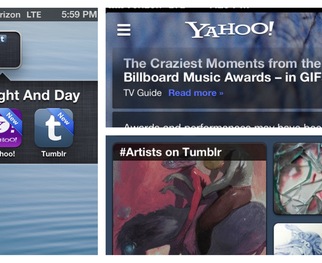
JEFFREY BROWN: And we turn to the blockbuster deal announced today in the tech world: giant, but troubled Yahoo buying the popular blogging site Tumblr. The purchasing price: $1.1 billion dollars. The prize: a fast-growing social media site that features more than 100 million blogs in its network and reaches several hundred million people worldwide.
It was started just six years ago by David Karp, who dropped out of high school to work in the tech field. He will remain as head of Tumblr.
This is the biggest move yet by Yahoo CEO Marissa Mayer, who joined the company just 10 months ago from Google. Today, she wrote on a Tumblr post, “We promise not to screw it up.”
Rebecca Lieb is research analyst of digital advertising and media for the Altimeter Group and joins us now.
Welcome to you.
So, why does Yahoo want to buy Tumblr? What’s the appeal?
REBECCA LIEB, Altimeter Group: There are several appealing things about Tumblr. There’s certainly the size of the audience, as you just mentioned, but also, perhaps more than that, the demographics of Tumblr’s audience.
Yahoo has been losing users, losing eyeballs for years now. Tumblr represents the millennials, those 20-somethings who didn’t abandon Yahoo because they probably never aligned with the platform in the first place. This is a group that is incredibly important to the advertisers Yahoo is trying to attract.
JEFFREY BROWN: Explain for our non-Tumblr users in the audience what it is. How has it been able to rise so fast and appeal to so many people?
REBECCA LIEB: Tumblr is a blogging platform that is very, very image-centric. It’s very focused on users uploading photographs.
And this younger demographic is a very, very mobile demographic. These are people who have their smartphones with them at all times. And as anybody with a smartphone knows, it’s much easier to update your status with a quick photo of what you’re doing or what you’re eating or what you’re seeing than it is typing with your thumbs.
We saw a very recent move like this when Facebook acquired Instagram last year, also for a billion dollars, which raised some eyebrows at the time. And Facebook has subsequently redesigned its news stream to focus more on these images, as its users migrate to mobile platforms.
I believe that Yahoo is trying to do very much the same thing. And, in fact, since the announcement of the Tumblr acquisition, Yahoo has announced that they will be giving users substantially more free space on Flickr, also a Yahoo property.
So we’re seeing a big move towards images and a big move towards mobile on Yahoo’s part.
JEFFREY BROWN: In all of these new deals, and this one in particular, the question is still, how do you make money out of it, right? I mean, what would happen in this case? Is it likely we’d see money made through the advertising on Tumblr or what?
REBECCA LIEB: I think that this is a very interesting two-way street.
Yahoo, of course, is a traditional new media company, if you can — to coin a phrase. In other words, they have very interruptive display advertising, the “click here, buy this now” type. Tumblr has been experimenting with what’s called “content marketing” and forms of what’s known as “native advertising.”
This is — these are marketing messages, but they’re more subtly integrated into the interface. They don’t shout at the user. They don’t interrupt the user. They’re part of the stream and they’re meant to attract, rather than to interrupt.
Yahoo for the time being will leave Tumblr alone. If they slap these interactive ads up on Tumblr, the users will probably abandon the property. At the same time, Yahoo is going to learn from these Tumblr products and try and incorporate them into Yahoo’s more traditional properties.
JEFFREY BROWN: When you — go ahead.
REBECCA LIEB: At the same time, Yahoo can introduce Tumblr to larger brands and more traditional advertisers, the P&Gs of the world, the McDonald’s of the world. So, this does have the potential to benefit both parties monetarily.
JEFFREY BROWN: I was thinking, when you were referring to the possibility of users migrating or leaving, apparently, there’s reports that already some of that is happening. But that just shows how fragile this whole system is, right, this ecosystem of companies and where users go.
REBECCA LIEB: Absolutely.
You know, we have seen companies like Yahoo stumble and lose their luster, AOL, MySpace, in periods of times that are less than a decade. It took companies like Pan American Airlines or Ford Motor companies perhaps a century to rise to ascendance and then to lose their luster.
Internet companies can do it seemingly overnight. Marissa Mayer is trying to bring Yahoo back from the brink, as her former Google colleague Tim Armstrong is similarly trying over at AOL.
JEFFREY BROWN: And just briefly, when she writes that post, “We won’t screw it up,” she is writing that because she knows a lot of people remember Yahoo apparently just — doing just that, right, with other acquisitions.
REBECCA LIEB: Not on Marissa Mayer’s watch.
JEFFREY BROWN: Right.
REBECCA LIEB: She is relatively new at the company. She’s been there less than a year.
But, indeed, Yahoo has made acquisitions and screwed them up. So did News Corp. when it acquired MySpace. One of Yahoo’s real challenges is going to be how to keep Tumblr cool when it’s owned by what is very easily perceived by its very young, very hip user base to be a corporate overlord.
JEFFREY BROWN: Rebecca Lieb, thanks so much.
Watch Yahoo Makes Bid for Reboot With $1.1 Billion Deal for Tumblr on PBS.

